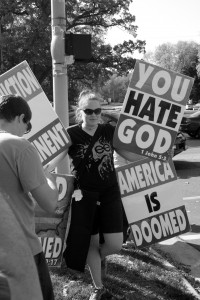 Fifteen years ago this October, a man riding his bike outside of Laramie, Wyoming noticed a scarecrow tied to a fence. Upon closer inspection, he saw it was man laying on his side, hands bound behind his back and brutally beaten.
Fifteen years ago this October, a man riding his bike outside of Laramie, Wyoming noticed a scarecrow tied to a fence. Upon closer inspection, he saw it was man laying on his side, hands bound behind his back and brutally beaten.
It was the unconscious Matthew Shepard, an openly gay student at the University of Wyoming.
The night before, the 21-year-old had accepted a ride from two young men. Targeted for his sexual orientation, Shepard was pistol-whipped and left for dead by his attackers, who were later sentenced for life. Never awakening from his coma, Shepard was taken off life support and pronounced dead on Oct. 12, 1998. However, his death would be far from the end of the story.
Matthew became a martyr for gay activists worldwide, with vigils held in the days following his death and every anniversary since. Films, such as The Matthew Shepard Story, and the play The Laramie Project, have been produced to tell the story of Matthew, a 5’2” 105 pound young man known for being kind-hearted, concerned with social rights, and goal-driven.
His mother, Judy Shepard, started the Matthew Shepard Foundation to help spread acceptance for LGBT youth. Matthew’s friend, Romaine Patterson, started a radio broadcast advocating for gay rights that is still very prominent today. Elton John and Melissa Etheridge wrote songs about Matthew. John even performed in Laramie on the 10th anniversary of Matthew’s death.
And in 2009, Barack Obama met Judy and signed the Matthew Shepard and James Byrd Act, one of the most extensive pieces of federal legislation advocating for hate crime regulations.
Vigils continued this October in cities across the country for the 15th anniversary. Shepard’s father addressed the public, pleading for parents to be accepting of their children. Fifteen years later, Matthew’s story continues to inspire and hold relevance.
While the LGBT community has taken great leaps and bounds over the past 15 years, many states are lagging. In the majority of states, it is still legal for someone to be fired from a job due to their sexual orientation. Equal marriage, pay, and the ability to file for a hate crime are unsupported by law in many of these same states. To this day, Wyoming has no law to address hate crimes.

In Judy Shepard’s book, The Meaning of Matthew: My Son’s Murder in Laramie, and a World Transformed, she dispels many of the rumors about Matthew that the media fabricated in the early days following his death.
He struggled with depression, anxiety, and possessed a temper, but he was truly concerned with social rights and wanted to change the world.
Whether it is spray paint along a sidewalk, bullying, propaganda, or even murder, any hate crime is committed with the intention to scare people for who they are, what they do, or by how they live.
Stories like Matthew’s should leave an impression on us, no matter our views of his sexual orientation. He was a young man with a promising future, but his life was brutally cut short when two men ignored his pleas for life and beat him to death.
In today’s world, it’s our responsibility to take action so that others are not targeted because they are different or misunderstood.
While Matthew no longer has a voice, those of us who carry his story possess the power to spark change. It becomes our responsibility to stand up for the targeted.
It’s what Matthew would have wanted.